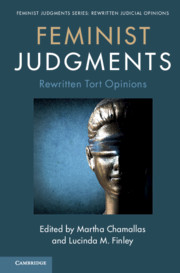Book contents
- feminist judgments: rewritten tort opinions
- Feminist Judgments Series Editors
- Feminist Judgments: Rewritten Tort Opinions
- Copyright page
- Contents
- Notes on Contributors
- Preface
- Table of Cases
- Part I Introduction
- Part II The Classics
- Part III Intentional Torts
- Part IV Negligence and Vicarious Liability
- 10 Commentary on Sharon P. v. Arman, Ltd.
- 11 Commentary on Broadnax v. Gonzalez
- 12 Commentary on Boyles v. Kerr
- 13 Commentary on Emerson v. Magendantz
- 14 Commentary on McCarty v. Pheasant Run
- 15 Commentary on Lisa M. v. Henry Mayo Newhall Memorial Hospital
- Part V Damages
- Index
14 - Commentary on McCarty v. Pheasant Run
from Part IV - Negligence and Vicarious Liability
Published online by Cambridge University Press: 28 November 2020
- feminist judgments: rewritten tort opinions
- Feminist Judgments Series Editors
- Feminist Judgments: Rewritten Tort Opinions
- Copyright page
- Contents
- Notes on Contributors
- Preface
- Table of Cases
- Part I Introduction
- Part II The Classics
- Part III Intentional Torts
- Part IV Negligence and Vicarious Liability
- 10 Commentary on Sharon P. v. Arman, Ltd.
- 11 Commentary on Broadnax v. Gonzalez
- 12 Commentary on Boyles v. Kerr
- 13 Commentary on Emerson v. Magendantz
- 14 Commentary on McCarty v. Pheasant Run
- 15 Commentary on Lisa M. v. Henry Mayo Newhall Memorial Hospital
- Part V Damages
- Index
Summary
Judge Richard Posner’s opinion in McCarty v. Pheasant Run, Inc. exemplifies his use of a law and economics approach in tort cases. Applying the famous risk–utility test found in the “Hand formula,” Posner refused to impose negligence liability on a hotel in a case in which a woman was assaulted by an unknown assailant who gained access to her room through an unlocked door that opened into a courtyard. The rewritten feminist dissent objects to the use of the risk–utility test in sexual violence cases where the “loss” being quantified (i.e., a deprivation of personal autonomy) is often undervalued and misunderstood. To eliminate the risk of victim-blaming, the feminist opinion would change the law to disallow a contributory negligence defense to limit a plaintiff’s recovery in cases of rape and sexual assault. The accompanying commentary discusses how Judge Posner’s rhetoric and his law and economic philosophy leads him to weigh the economic interests of businesses over women’s physical and emotional well-being.
Keywords
- Type
- Chapter
- Information
- Feminist Judgments: Rewritten Tort Opinions , pp. 314 - 334Publisher: Cambridge University PressPrint publication year: 2020

